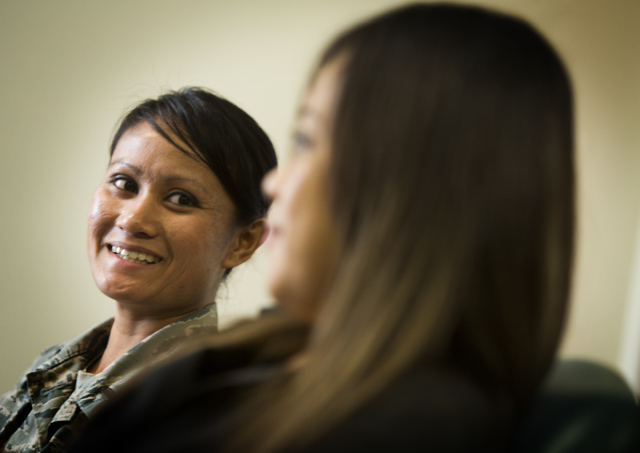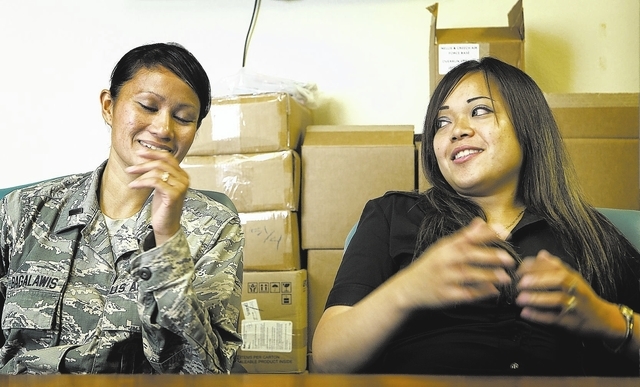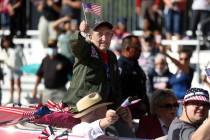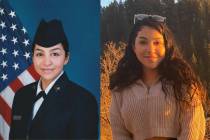Same-sex couples enroll for benefits at Nellis


In keeping with her leadership style, 1st Lt. Michelle Bagalawis wasted no time enrolling her same-sex spouse for military benefits when the doors opened Tuesday at Nellis Air Force Base for legally married gays and lesbians to apply.
“I want to be the first one in line,” she said, recalling the telephone conversation she had a few weeks ago with someone at the base benefits office.
“They said, ‘Well, it’s just like everybody else: first come, first served.’ I told her, ‘That’s right. First come, first served,’ because if they let me go first that would be discrimination,’ ” the 32-year-old Bagalawis said.
Both Bagalawis and her spouse, Suzanne Angeles-Bagalawis, 31, know about discrimination and what it took for homosexuals in the military to be accepted in the ranks, let alone receive the same benefits as heterosexual married couples.
By 8:20 a.m. Tuesday, they had entered their names in the Defense Enrollment Eligibility Reporting System, just ahead of another lesbian couple who enrolled Tuesday, the first day for legally married same-sex couples to do so since the Supreme Court decision that struck down the Defense of Marriage Act.
Benefits including base housing, commissary privileges, medical care and service members life insurance were made available to legally married same-sex spouses and their dependents retroactive to the date of the ruling, June 26.
That means even in states that don’t recognize same-sex marriages, like Nevada, the ruling applies to federal military installations such as Nellis and Creech Air Force bases as well as members of the Nevada National Guard who are eligible for federal benefits.
To qualify for benefits, same-sex spouses must hold marriage certificates from one of the 13 states or the District of Columbia that recognize gay marriages — California, Washington, Iowa, Vermont, Connecticut, Maryland, Maine, New York, Massachusetts, Minnesota, New Hampshire, Delaware and Rhode Island.
Nellis officials said they don’t know how many same-sex spouses will apply for benefits or what the costs will be because the program has just begun.
During an interview Tuesday at the Nellis public affairs conference room, Bagalawis noted that she and her spouse are both of Filipino descent. They met in 2002 at Sheppard Air Force Base in Wichita Falls, Texas, and were married in Des Moines, Iowa, on March 19, 2012.
Bagalawis is an education and training chief for an Air Combat Command training support squadron at Nellis.
Angeles-Bagalawis, now a civilian who sells time shares locally, had been an enlisted airman but was medically discharged. She was traveling with Bagalawis last year when they decided to get married in Iowa.
“We talked about it and then I gave her a ring,” Bagalawis said, describing a small ceremony that followed. It was her second wedding and Angeles-Bagalawis’ first. They have a 6-year-old son from Bagalawis’ first marriage to an enlisted man that lasted two years.
The aspect of military benefits wasn’t on the radar at the time the women were married.
“She just wanted the name and to be connected at least to me,” Bagalawis said. “I said, ‘Now you’re married to the Air Force.’ That’s a nice feeling.”
After all the anticipation, and before they applied for medical benefits Tuesday, Angeles-Bagalawis finally received her military spouse identification card, which allows her access to the base commissary.
And that’s a relief to both women.
“Now she doesn’t have to be there for three hours. I can be there by myself,” Angeles-Bagalawis said.
Bagalawis said the stigma of being gay or lesbian in the Air Force is gradually fading. “I think it’s gotten better. I don’t really hear any remarks,” she said. “I’ve been open to my commander and some people at work and they’ve said if anything comes up just bring it to our attention.
“I think a lot more people are watching what they say and what they do,” Bagalawis said. “I think we’ve come a long way. Now, because of things being so accepted, it allows people to be more open to be who they are to at least do their job and feel that they’re not going to get ridiculed or scrutinized for their lifestyle.”
As for her spouse, “I’m just open. Nothing bothers me.”
Angeles-Bagalawis grew up in Long Beach, Calif. She said she wasn’t open about her homosexuality until she was 18 “so it was hard, especially in the military. When I was in the Air Force I had to hide.”
Bagalawis said the military’s social evolution from the days of don’t-ask-don’t-tell to the repeal of the Defense of Marriage Act and granting of benefits “is a big step. It’s going to take some time for a lot of people to get used to.”
“I’m sure people are still talking in their own inner cliques about what they think about same-sex marriage in the Air Force,” she said.
“I’m excited. I feel great about it.”
She looks up to Air Force Maj. Gen. Patricia Rose, the highest-ranking openly gay officer in the military who was promoted on May 31. “If she can do it, well that’s more for me as a first lieutenant to try to do that.”
Contact reporter Keith Rogers at krogers@reviewjournal.com or 702-383-0308.


















